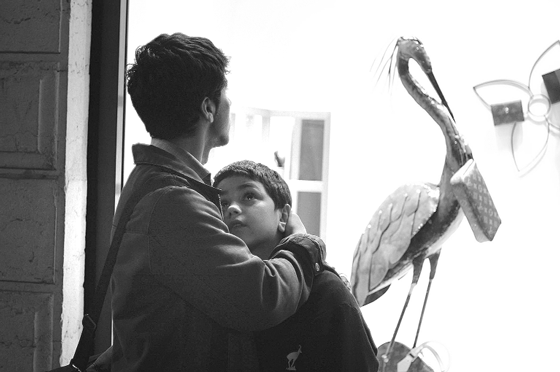Ritual vendettas entrap migrants in Europe’s promised land
Erdal Celik as Azad holds Xewat Gectan as Ibo, both Kurdish refugees living in Germany. (Koch Lorber Films.)
Following its “B Noir” cavalcade and the currently running émigré thriller “13 Tzameti,” Film Forum continues to plumb the many permutations of noir with “Fratricide,” the third feature from Yilmaz Arslan. A tough diasporic drama with a rat’s-eye view on Merkel’s neoliberal Germany, “Fratricide” restages the obdurate Turkish-Kurdish conflict as classy bloodstained pulp.
A speck on a vast plain of dust resolves into Azad Karaman (Erdal Celik), a shepherd grazing a small flock seen through the car window of a messenger conveying a packet to his father. Azad’s older brother Semo (Nurretin Celik) has sent funds for the youth to travel from their home near Diyarbakir in Turkish Kurdistan and join him in Germany, where he says opportunity awaits. Simultaneously, a fleet prologue gives us 11-year-old Ibrahim (Xewat Gectan), whose grandfather daubs his unlined forehead with ichor from a sheep sacrificed at unnervingly close range.
Azad’s father sees him off with a fistful of Kurdish earth in the pocket of his darned jacket. He climbs aboard a rude jitney, and his mother hurls water from a tin pitcher as it pulls away, praying, “May no road be forbidden to you.” A fellow passenger offers Azad an unsolicited prophecy, encapsulating the film’s plot: “You’ll lose a brother, but will find another. Go without delay to the country of your beloved.” Over a shot gliding through an empty tunnel, Ibrahim intones, “At the end of this tunnel shines the light of money. When you reach it, you start to die slowly,” preternaturally jaundiced before he’s even reached the new land.
Azad has arrived and gotten situated before little Ibo, so when they meet as bunkmates in a state-run migrant shelter, he shares the rundown and almost at once they’re inseparable. Desensitized American viewers may gape at the humane polyglot equilibrium of the migrant center, where clean co-ed dorms house and feed a dizzying array waiting for their papers to be processed, and sternly benign pink-faced social workers disburse monthly cash allowances. There’s even room for romance–beset by intrigues, Azad is slow to grasp that the Albanian refugee Mirka (Xhiljona Ndoja) has had eyes for him from the start.
Though Azad would be content to carry on building the clientele for a pissant barbershop he’s set up in the toilet of a Muslim men’s club, with Ibo as his apprentice, both are both swept as if ineluctably into the violence of Semo’s world and the animus between Kurds and Turks, even as fellow exiles. Semo has indeed made his niche, as a pimp farming out young Russian women at truck stops. Azad wants nothing to do with it, but one afternoon the three men encounter the second-generation Turkish immigrant thug Ahmet (Oral Uyan) walking his pit bull. A bristling exchange ends with knives drawn and Ahmet’s entrails being ripped from his perforated belly and devoured on the pavement by his own cur.
And so the clock starts on revenge. Semo, who stabbed the man, goes into hiding and begs to be smuggled abroad by the Kurdish underground, while Azad and Ibo are swiftly abducted by Ahmet’s comparably thuggish brother Zeki (Bulent Buyukasik), who breaks Azad’s face and, worse, his income-earning fingers. To force him to name Ahmet’s assailant, Zeki also rapes Ibo, in a scene as disturbing for its headlong brutality as for its unsubtle imputation of pederasty expressive of his ethnicity; he later refers back to it with relish.
Obeying some impetus deeper than reason, Azad automatically sets about avenging his “little brother’s” despoiled honor while betraying Semo to the cops as repayment for his ticket to Europe. At a Newroz celebration, with men hurdling over a bonfire and inflamed speechifying from Zilan (Taies Farzan), a sultry nationalist agitator, Ibo spots the plainclothes detectives trailing Azad. At this, Azad walks over to and embraces Semo, damning him with a kiss on the cheek.
By motivating Azad’s retribution, Ibo inadvertently commits his only friend to mortal self-sacrifice; Azad knows he’ll pay for upholding Ibo’s honor yet never swerves from this imagined onus. Even after we leave them, the film suggests Ibo may persist in killing his brethren, believing it the coin of survival inside Fortress Europe. One day in a downpour, another Kurdish lad of the same age scolds Ibo for encroaching on his newspaper delivery route. Having already assimilated brutality, he now dispenses it by pummeling the kid unconscious, rinsing the blood off his hands in the swollen gutter.
Unusual not only for its depiction of Kurdish nationalist organizing in a Western European setting like Germany, where the Kurdistan Workers’ Party is banned, “Fratricide” is the only film I’m aware of to venture principled, sympathetic critique of such politics. After Semo is locked up and then murdered in prison, Zilan’s deputy approaches Azad to authorize a public demonstration. Although bailed out by them earlier, he sharply rebukes the activists for exploiting senseless death and private misery for demagogic ends.
Noir or folk ballad? Arslan punctuates the story with nonlinear scenes of a chorus of Kurdish elders in traditional garb, wending through snow-brushed mountains by torchlight, as a voice-over recites a legend of their deliverance from the oppressor’s yoke. Fatalistically, the film suggests modern society is a thin veneer behind which immemorial patterns—of aspiration, toil, defeat, carnage—endure unbroken.
gaycitynews.com



































